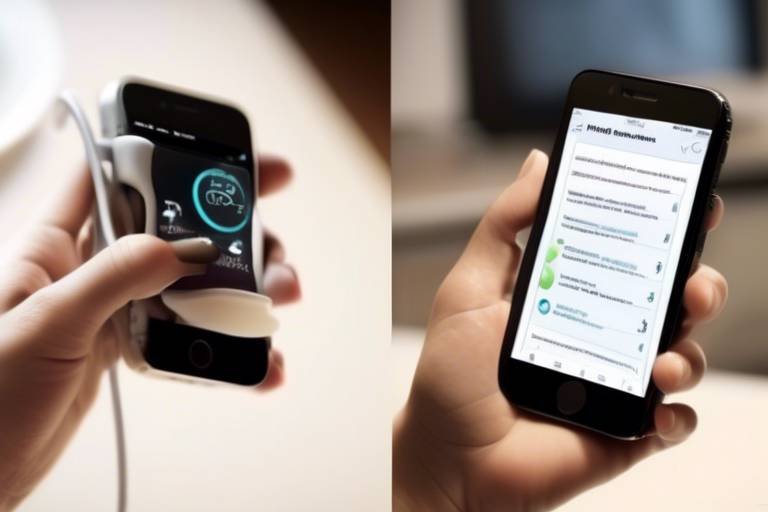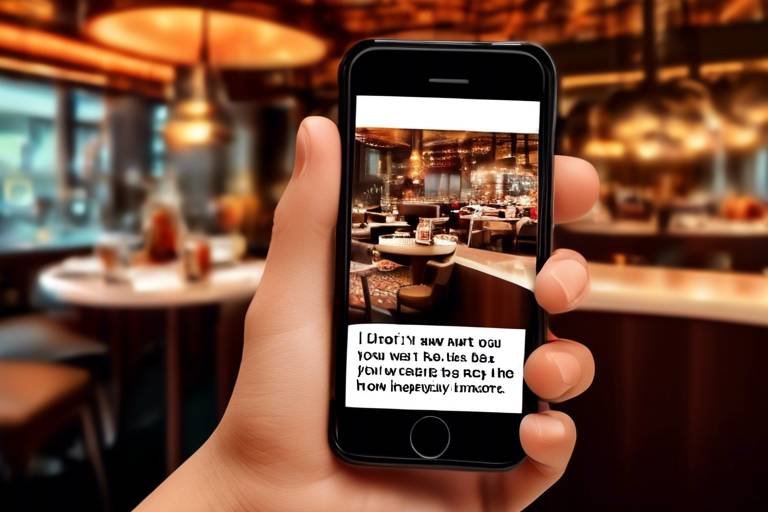The Impact of Smart Devices on Daily Routines
In today's fast-paced world, smart devices have become an integral part of our daily lives. From smartphones to smartwatches, these devices have revolutionized the way we interact, work, and manage our health. Imagine waking up to a gentle alarm from your smartwatch, which also tracks your sleep quality, followed by a quick glance at your smartphone to check messages, emails, and social media updates—all before you even get out of bed! This seamless integration of technology not only enhances our productivity but also transforms mundane tasks into more efficient processes.
One of the most remarkable aspects of smart devices is their ability to foster instant communication. With just a few taps on a screen, we can connect with anyone around the globe. This has not only strengthened personal relationships but has also changed the landscape of professional communication. Remote work has gained traction, allowing people to collaborate from different corners of the world without missing a beat. The convenience of video calls, instant messaging, and collaborative platforms means that the traditional office is no longer a necessity. Instead, our homes have morphed into productive workspaces equipped with smart technology that keeps us connected and engaged.
Moreover, smart devices play a crucial role in health management. The rise of wearable technology has empowered users to take charge of their health like never before. Imagine having a personal trainer on your wrist, guiding you through workouts and tracking your progress in real-time! These devices collect data on various health metrics such as heart rate, steps taken, and even sleep patterns. This information promotes awareness and encourages healthier lifestyle choices. With the ability to monitor our health at our fingertips, we can make informed decisions that lead to improved well-being.
However, the impact of smart devices extends beyond just communication and health. Home automation is another area where these gadgets shine. Smart home devices allow us to control everything from lighting to security systems with a simple voice command or tap on our smartphones. Picture coming home after a long day, and with a single command, your lights turn on, your thermostat adjusts to the perfect temperature, and your security system is activated. This level of convenience not only enhances our living experience but also contributes to energy efficiency and safety.
While the benefits of smart devices are numerous, it's essential to acknowledge the challenges they bring. Privacy concerns are at the forefront of discussions surrounding smart technology. As we become more reliant on these devices, the data they collect raises questions about security and personal information. Additionally, the dependency on technology can lead to issues when devices fail or malfunction, creating disruptions in our daily routines. It's crucial to find a balance between embracing innovation and maintaining control over our privacy and well-being.
In conclusion, smart devices have undeniably transformed our daily routines, making life more convenient, connected, and health-conscious. As we navigate this digital landscape, it's essential to stay informed and proactive about the challenges that come with these advancements. Embracing the benefits while being mindful of the potential drawbacks will help us maximize the advantages of smart technology in our lives.
- What are smart devices? Smart devices are electronic gadgets that connect to the internet and can be controlled remotely, often providing enhanced functionality through apps and software.
- How do smart devices improve communication? They enable instant messaging, video calls, and collaborative workspaces, allowing for seamless communication regardless of location.
- Can smart devices help with health management? Yes, wearable technology allows users to track health metrics, encouraging healthier lifestyle choices and promoting overall well-being.
- What are the privacy concerns related to smart devices? Smart devices collect personal data, which can raise security issues and concerns about how that data is used and shared.
- How can I ensure my smart devices are secure? Regularly update your device software, use strong passwords, and be cautious about the information you share online.

Enhanced Communication
Smart devices have truly revolutionized the way we communicate, bringing the world closer together in ways we never thought possible. Gone are the days when sending a message took days or even weeks. Now, with just a few taps on our screens, we can connect with friends, family, and colleagues across the globe in an instant. Isn't that amazing? Imagine being able to share a moment, a thought, or even a laugh with someone thousands of miles away, all thanks to the power of technology!
With platforms like WhatsApp, Facebook Messenger, and Zoom, smart devices have become the backbone of our daily interactions. These applications not only allow us to send texts but also facilitate video calls, voice messages, and even group chats. This means that whether you're at home, at work, or on the go, you can stay connected with those who matter most. It's like carrying a piece of your social life in your pocket!
Moreover, remote work has become a norm for many, and smart devices play a pivotal role in this shift. Imagine collaborating on a project with a team spread across different continents. With tools like Slack and Trello, team members can communicate in real-time, share files, and track progress, all from their smart devices. This level of connectivity not only enhances productivity but also fosters a sense of community among remote workers.
However, while the benefits are undeniable, it's essential to recognize that this constant connectivity can come with its own set of challenges. The pressure to respond immediately can lead to feelings of being overwhelmed or stressed. It's a double-edged sword: on one hand, we have the gift of instant communication, and on the other, we may struggle with the expectation of being always available. Balancing these aspects is crucial for maintaining healthy relationships and personal well-being.
In conclusion, smart devices have transformed communication in ways that enhance our lives and bring us closer together. They allow us to share our experiences, collaborate on projects, and maintain relationships, regardless of distance. As we continue to embrace these technologies, it's vital to be aware of the impact they have on our lives and to use them in a way that enriches our connections rather than complicates them.

Health Monitoring
In today's fast-paced world, has become more accessible and essential than ever, thanks to the rise of smart devices. These innovative gadgets, such as fitness trackers and smartwatches, empower users to take charge of their health like never before. Imagine having a personal health assistant right on your wrist, constantly tracking your metrics and providing insights that can lead to better lifestyle choices. With the ability to monitor heart rate, sleep patterns, and even stress levels, these devices are revolutionizing how we think about our well-being.
One of the most significant advantages of wearable technology is the real-time health data it provides. Users can easily access information about their daily activity levels, calories burned, and even their hydration status. This immediate feedback encourages individuals to stay active and make healthier decisions throughout the day. For instance, if a user notices they’ve been sedentary for too long, their device might send a gentle reminder to get up and move. This simple nudge can make a world of difference in maintaining an active lifestyle.
Moreover, smart devices are not just about tracking physical activity; they also play a crucial role in nutrition management. Many apps linked to these devices allow users to log their meals, track calorie intake, and monitor their macronutrient ratios. This level of detail enables users to make informed dietary choices, ultimately leading to better health outcomes. For example, a user might discover that they’re not getting enough protein in their diet and can adjust their meals accordingly. With the help of technology, eating right has never been easier.
Another critical aspect of health monitoring is sleep quality improvement. Poor sleep can lead to a myriad of health issues, including weight gain, decreased productivity, and even chronic diseases. Smart devices equipped with sleep tracking features analyze users' sleep patterns, providing insights into their sleep cycles, duration, and quality. Armed with this information, users can make necessary adjustments to their bedtime routines. Perhaps they’ll realize that cutting out screen time before bed leads to a more restful night. This kind of awareness is invaluable for anyone looking to enhance their overall well-being.
To give you a clearer picture of how health monitoring through smart devices works, here’s a quick overview:
| Health Metric | Smart Device Function | Benefits |
|---|---|---|
| Heart Rate | Continuous monitoring | Helps in understanding cardiovascular health |
| Sleep Patterns | Sleep cycle analysis | Improves sleep quality and duration |
| Activity Levels | Step counting and exercise tracking | Encourages physical activity and weight management |
| Nutrition | Calorie and nutrient tracking | Promotes healthier eating habits |
In conclusion, smart devices are not just trendy gadgets; they are powerful tools that can significantly enhance our health monitoring capabilities. By providing valuable insights into our daily habits and health metrics, these devices encourage us to make better choices, ultimately leading to a healthier and more fulfilling life. However, as with any technology, it’s essential to use these tools wisely and not become overly reliant on them. Balancing technology with mindful living is key to reaping the full benefits of health monitoring.
- What types of health metrics can smart devices track? Smart devices can track various health metrics, including heart rate, sleep patterns, steps taken, calories burned, and even stress levels.
- Are smart devices accurate in health monitoring? While most smart devices provide reasonably accurate data, it’s important to remember that they are not a substitute for professional medical advice or diagnosis.
- Can I use smart devices to manage chronic health conditions? Yes, many smart devices offer features that can help users manage chronic conditions by tracking relevant health metrics and providing reminders for medication or appointments.
- How can I improve my sleep quality using a smart device? By analyzing your sleep patterns, smart devices can offer insights and suggestions, such as adjusting your bedtime routine or reducing screen time before sleep.

Fitness Tracking
In today's fast-paced world, staying fit and healthy can feel like an uphill battle. Enter —the game-changing technology that has made it easier than ever to monitor our physical activity and health metrics. With the help of wearable devices and fitness apps, we can now keep a close eye on our daily movements, heart rates, and even our sleep patterns. But how exactly does this work, and what makes it so appealing?
Imagine strapping on a sleek wristband that not only counts your steps but also motivates you to push your limits. These devices use advanced sensors to track various metrics, providing users with real-time feedback on their performance. For example, if you’re walking, running, or cycling, your device can give you instant updates on your distance covered, calories burned, and heart rate. This immediate feedback acts like a personal trainer on your wrist, encouraging you to stay active and achieve your fitness goals.
Moreover, many fitness tracking apps offer personalized workout plans tailored to your individual needs. This means you don’t have to guess what exercises will work best for you; instead, you can rely on data-driven insights to guide your routine. By analyzing your previous workouts and progress, these apps can suggest adjustments to optimize your training. For instance, if you’ve been consistently hitting a plateau, the app might recommend increasing your workout intensity or trying new exercises to keep things fresh and challenging.
But it doesn't stop there! The social aspect of fitness tracking is another appealing feature. Many apps allow you to connect with friends, join challenges, and share your achievements. This sense of community can be incredibly motivating. Have you ever found yourself pushing harder because you know your friends are watching? It’s like having a cheering squad right in your pocket! Plus, some apps even incorporate gamification elements, turning your fitness journey into a fun competition, complete with badges and rewards.
To give you a clearer picture, here’s a quick overview of the key features often found in fitness tracking devices:
| Feature | Description |
|---|---|
| Step Tracking | Counts the number of steps taken throughout the day. |
| Heart Rate Monitoring | Tracks heart rate in real-time during activities. |
| Calorie Tracking | Estimates calories burned based on activity level. |
| Sleep Tracking | Monitors sleep patterns and quality. |
| Workout Plans | Provides personalized workout suggestions. |
As you can see, the capabilities of fitness trackers go far beyond simple step counting. They offer a comprehensive view of your health, making it easier to identify areas for improvement. However, like any technology, it’s essential to use these tools wisely. Over-reliance on data can sometimes lead to anxiety or stress about performance. Balancing the use of fitness trackers with a healthy mindset is crucial for long-term success.
In conclusion, fitness tracking has revolutionized the way we approach our health and wellness. By providing real-time feedback, personalized plans, and a supportive community, these devices empower us to take charge of our fitness journeys. So, are you ready to strap on a fitness tracker and start moving towards your goals? The future of fitness is just a heartbeat away!
- What is a fitness tracker? A fitness tracker is a wearable device that monitors and records various health metrics, including steps taken, heart rate, and sleep quality.
- Do I need a smartphone to use a fitness tracker? While many fitness trackers can operate independently, connecting to a smartphone enhances their functionality, allowing for data analysis and social features.
- Can fitness trackers help with weight loss? Yes, fitness trackers can help you monitor your activity levels and caloric intake, which can contribute to weight loss when combined with a healthy diet.
- Are fitness trackers accurate? Most fitness trackers provide reasonably accurate data, but they may not be 100% precise. They are best used as a guide rather than an absolute measure.

Nutrition Management
In today's fast-paced world, maintaining a balanced diet can feel like a daunting task. That's where smart devices come into play, acting as personal nutrition assistants right in our pockets. With the help of various applications and wearables, users can now take charge of their dietary habits like never before. Imagine having a personal nutritionist available 24/7, guiding you through meal planning, calorie counting, and even suggesting recipes tailored to your preferences. This technology empowers individuals to make informed choices, transforming the way we think about food and nutrition.
One of the standout features of these smart devices is their ability to track and analyze food intake. Users can easily log their meals using intuitive apps, which often come equipped with vast databases of food items. This not only helps in monitoring caloric intake but also allows users to understand the nutritional value of what they're consuming. For example, a simple scan of a barcode can provide detailed information about the calories, fats, proteins, and carbohydrates in a product. This level of transparency is invaluable for those looking to maintain or lose weight and for anyone aiming to improve their overall health.
Moreover, many of these applications offer personalized meal planning based on dietary preferences and restrictions. Whether you're vegan, gluten-free, or just trying to cut down on sugar, there’s likely an app that can cater to your needs. Users can input their dietary goals, and the app will generate meal plans that align with those objectives. This not only saves time but also takes the guesswork out of meal preparation. Imagine not having to stare blankly into your fridge, wondering what to cook. Instead, your smart device provides you with a tailored menu, complete with shopping lists!
Additionally, some smart devices integrate with wearables to provide a holistic view of your health. For instance, a fitness tracker can monitor your activity levels, while a nutrition app tracks your food intake. Together, they can offer insights into how your diet affects your energy levels and performance. This synergy between fitness and nutrition is crucial for anyone serious about their health journey. You can see how those extra calories from that chocolate cake might impact your workout the next day, leading to more mindful eating.
However, while smart devices offer incredible benefits for nutrition management, they also come with challenges. Over-reliance on technology can lead to an unhealthy obsession with tracking every calorie or nutrient, which can be counterproductive. It's essential to strike a balance between utilizing these tools and listening to your body. After all, nutrition isn't just about numbers; it's about nourishing your body and enjoying the food you eat.
In conclusion, smart devices are revolutionizing nutrition management by providing tools that help users make informed and healthy dietary choices. They simplify meal planning, enhance awareness of nutritional intake, and promote healthier lifestyles. Yet, as with any technology, it's crucial to use these devices wisely, ensuring they serve as a guide rather than a strict set of rules.
- How can smart devices help with meal planning?
Smart devices can generate personalized meal plans based on your dietary preferences and restrictions, making it easier to prepare balanced meals. - Are there any downsides to using nutrition apps?
While they can be helpful, over-reliance on these apps can lead to an unhealthy obsession with tracking food, which may not always be beneficial. - Can I integrate my fitness tracker with my nutrition app?
Many nutrition apps allow integration with fitness trackers, providing a comprehensive view of your health by combining activity levels with dietary intake. - What types of diets can smart devices accommodate?
Most nutrition apps can cater to various diets, including vegan, gluten-free, and low-carb, allowing for tailored meal planning.

Sleep Quality Improvement
In today's fast-paced world, getting a good night's sleep can sometimes feel like an elusive dream. However, smart devices are stepping in to help improve sleep quality for many individuals. With features designed to monitor and analyze sleep patterns, these devices provide valuable insights that can help users make informed decisions about their bedtime routines.
For instance, many wearable devices come equipped with sleep tracking capabilities. These gadgets monitor various metrics such as sleep duration, sleep stages (light, deep, and REM), and even disturbances throughout the night. By understanding these patterns, users can identify what factors may be affecting their sleep quality, whether it’s late-night screen time, caffeine consumption, or stress levels.
Moreover, some smart devices offer personalized recommendations based on the collected data. Imagine waking up feeling refreshed because your device suggested a bedtime that aligns with your natural sleep cycles! This tailored approach can significantly enhance your overall well-being. For example, a smart alarm clock can wake you gently during your light sleep phase, making it easier to rise and shine without that groggy feeling.
Additionally, smart devices often include features that promote better sleep hygiene. These can range from ambient noise machines that drown out disruptive sounds to blue light filters that reduce screen glare in the evening. Such functionalities can help create a more conducive sleep environment, allowing users to drift off more easily. Here’s a quick look at some popular sleep-improving features:
- Sleep Tracking: Monitors sleep stages and quality.
- Smart Alarms: Wakes you during light sleep.
- Ambient Sounds: Plays soothing sounds to mask noise.
- Sleep Insights: Provides data-driven recommendations.
However, while smart devices can be a boon for sleep quality, it’s essential to use them wisely. Over-reliance on technology can sometimes lead to anxiety about sleep metrics, creating a paradox where the very tools meant to help can become a source of stress. Therefore, it’s crucial to find a balance and integrate these devices into your routine without letting them dominate your nightly rituals.
In conclusion, smart devices have the potential to significantly enhance sleep quality by providing insights and recommendations tailored to individual needs. By leveraging technology responsibly, users can enjoy a more restful night and wake up rejuvenated, ready to tackle the day ahead.
Q1: How do smart devices track sleep quality?
A1: Smart devices use sensors to monitor movements, heart rate, and other physiological data to analyze sleep patterns and stages.
Q2: Can using smart devices before bed negatively impact sleep?
A2: Yes, exposure to blue light from screens can interfere with melatonin production, making it harder to fall asleep. It's advisable to use blue light filters or avoid screens before bedtime.
Q3: Are there any risks associated with using sleep-tracking devices?
A3: While generally safe, over-reliance on these devices can lead to sleep anxiety. It's essential to use them as a tool for improvement rather than a source of stress.
Q4: How can I improve my sleep without relying solely on smart devices?
A4: Establishing a consistent sleep schedule, creating a relaxing bedtime routine, and maintaining a comfortable sleep environment can all contribute to better sleep quality.

Remote Work Facilitation
In today's fast-paced world, the advent of smart devices has completely transformed the landscape of remote work. Gone are the days when employees were tethered to their desks in a traditional office setting. With the help of smartphones, tablets, and laptops, professionals can now connect and collaborate from virtually anywhere. This shift not only enhances productivity but also promotes a healthier work-life balance. Imagine being able to attend a crucial meeting while lounging on your couch or even taking a conference call from your favorite coffee shop! The flexibility that smart devices provide is a game-changer.
Moreover, smart devices come equipped with a plethora of applications designed specifically for remote work. Tools like Zoom, Slack, and Trello enable seamless communication and project management. These platforms allow teams to share ideas, assign tasks, and track progress in real-time, making collaboration feel as effortless as chatting with a friend. The ability to connect through video calls or instant messaging means that geographical barriers are no longer an obstacle. Instead of waiting for an email response, team members can engage in dynamic discussions that lead to quicker decisions and innovative solutions.
However, it's not just about communication. Smart devices also facilitate access to critical resources and information. Cloud storage solutions like Google Drive and Dropbox allow employees to store and retrieve documents from anywhere, ensuring that important files are always at their fingertips. This level of accessibility means that work can continue uninterrupted, even when team members are miles apart. In fact, studies show that companies leveraging smart devices for remote work often experience increased efficiency and employee satisfaction.
But let's not forget the importance of maintaining a structured work environment, even when working remotely. Smart devices can help establish routines and boundaries. For instance, productivity apps can set timers for focused work sessions, while calendar apps can schedule breaks and meetings. By utilizing these tools, employees can create a balanced workflow that maximizes their output without leading to burnout. It's like having a personal assistant reminding you to take a breather!
In summary, smart devices have not only made remote work possible but have also enriched the experience by fostering collaboration, enhancing accessibility, and promoting productivity. As we continue to embrace this digital age, the way we work will keep evolving, and smart devices will undoubtedly play a pivotal role in shaping our professional lives.
- What are the main benefits of using smart devices for remote work?
Smart devices enhance communication, provide access to essential resources, and promote a flexible work-life balance, making remote work more efficient and enjoyable. - How do smart devices improve collaboration among remote teams?
By utilizing applications for video conferencing, instant messaging, and project management, smart devices make it easy for teams to stay connected and work together effectively, regardless of their location. - Can smart devices help with work-life balance?
Yes! Smart devices allow users to set boundaries and create structured routines, which can lead to a healthier work-life balance while working remotely.

Home Automation
Imagine walking into your home, and with just a simple voice command or the tap of a button on your smartphone, the lights turn on, your favorite music starts playing, and the thermostat adjusts to your preferred temperature. This is the magic of home automation. Smart home devices have fundamentally changed how we interact with our living spaces, making our lives not only more convenient but also more secure and energy-efficient.
Home automation allows users to control various aspects of their home environment remotely, creating a seamless integration of technology into daily life. From smart speakers to intelligent lighting systems, the possibilities are virtually endless. These devices can be programmed to work together, allowing for a level of customization that was once the realm of science fiction. For instance, you can set your lights to dim automatically when you start a movie, or have your coffee maker begin brewing as soon as your morning alarm goes off. It’s all about making life easier and more enjoyable.
One of the most significant advantages of home automation is enhanced security. Smart security systems come equipped with features like real-time video surveillance, motion detection alerts, and remote locking mechanisms. This means that you can monitor your home from anywhere in the world, giving you peace of mind when you're away. Imagine receiving an alert on your phone if someone approaches your front door while you're on vacation!
Moreover, home automation systems can help you manage energy consumption more effectively. Smart thermostats learn your habits over time, adjusting the temperature based on your preferences and even your location. This not only leads to a more comfortable living environment but can also result in significant savings on your energy bills. For example, you can program your thermostat to lower the heating or cooling when you're not home, ensuring that energy is not wasted. In fact, studies have shown that homes with smart thermostats can save up to 10-15% on heating and cooling costs.
However, it's essential to consider the initial investment in smart home technology. While the long-term benefits often outweigh the costs, the upfront expenses can be a barrier for some. Nonetheless, as technology advances and becomes more accessible, prices are expected to decrease, making home automation a viable option for more households.
To summarize, home automation is not just a trend; it’s a lifestyle change that offers numerous benefits. From improving security and convenience to optimizing energy use, smart home devices are paving the way for a smarter, more efficient living environment. As we continue to embrace this technology, the future of home automation looks bright, promising even more innovations that will make our lives easier and more enjoyable.
- What are the benefits of home automation? Home automation enhances convenience, improves security, and optimizes energy consumption, leading to a more efficient and comfortable living environment.
- Are smart home devices expensive? While the initial investment can be significant, many devices offer long-term savings on energy bills, and prices are expected to decrease as technology advances.
- Can I control my smart home devices remotely? Yes, most smart home devices can be controlled through smartphone apps or voice commands, allowing for remote management of your home.
- Is home automation safe? While there are concerns about privacy and security, using reputable brands and keeping software updated can mitigate many risks associated with smart home devices.

Energy Management
In today's fast-paced world, managing energy consumption has become more crucial than ever. Smart devices, particularly smart thermostats and energy monitors, have emerged as game-changers in this arena. Imagine being able to control your home's heating and cooling systems from anywhere, using just your smartphone. This level of convenience not only enhances comfort but also significantly reduces energy bills. With the ability to set schedules and monitor usage patterns, these devices empower users to make informed decisions about their energy consumption.
One of the most impressive features of smart energy management is the real-time feedback provided by these devices. For instance, smart thermostats learn your habits over time, adjusting the temperature automatically when you're home or away. This means no more wasting energy heating or cooling an empty house. Additionally, many of these devices come equipped with energy usage reports, giving you insights into which appliances consume the most energy. This information can be eye-opening and encourages users to change their habits for the better.
Furthermore, smart energy management systems can be integrated with other smart home devices, creating a seamless ecosystem that optimizes energy use throughout your home. For example, when you leave for work, your smart thermostat can communicate with your smart lights to turn them off, ensuring that energy isn't wasted. This interconnectedness not only enhances efficiency but also contributes to a more sustainable lifestyle.
To illustrate the potential savings and benefits, consider the following table that compares traditional energy management practices with smart energy management:
| Feature | Traditional Energy Management | Smart Energy Management |
|---|---|---|
| Control Method | Manual adjustments | Remote access via smartphone |
| Energy Usage Insights | Monthly bills | Real-time usage reports |
| Learning Capability | None | Adapts to user behavior |
| Integration with Other Devices | Limited | Seamless integration with smart home systems |
As you can see, the advantages of smart energy management are significant. Not only do these devices help in reducing costs, but they also promote a more eco-friendly lifestyle. By making small adjustments and utilizing smart technology, users can contribute to a larger movement towards energy conservation and sustainability.
- How much can I save on my energy bills with smart devices?
While savings vary by household, many users report reductions of 10-30% on their energy bills after implementing smart energy management systems.
- Are smart thermostats difficult to install?
Most smart thermostats are designed for easy installation, often taking less than 30 minutes, and many come with step-by-step guides or app support.
- Do I need a strong internet connection for smart devices?
Yes, a reliable internet connection is essential for smart devices to communicate effectively and provide real-time data.
- Can I control my smart devices when I'm away from home?
Absolutely! Most smart devices come with mobile apps that allow you to control them remotely, ensuring that your home is always optimized for energy efficiency.

Security Enhancements
In today's world, where safety concerns are ever-present, smart security systems have emerged as a beacon of hope for homeowners and renters alike. These devices are not just about keeping an eye on your property; they represent a significant leap forward in how we perceive and manage security. Imagine being able to monitor your home from anywhere in the world, all from the palm of your hand! With features like real-time alerts, high-definition video streaming, and remote access, smart security systems are transforming the landscape of home safety.
One of the most compelling aspects of these systems is their ability to integrate with other smart devices. For instance, if motion is detected by your security camera, it can automatically trigger your smart lights to turn on, creating the illusion that someone is home. This deterrent effect can significantly reduce the likelihood of break-ins. Moreover, many of these systems come equipped with facial recognition technology, allowing you to receive notifications about who is at your door, whether it’s a friend, a delivery person, or an unexpected visitor.
Furthermore, let’s talk about peace of mind. The ability to check on your home while on vacation or at work can be incredibly reassuring. You can receive alerts directly to your smartphone about any unusual activity, ensuring that you are always in the loop. Many systems even offer cloud storage for video footage, which means that you can review past incidents if needed. This feature is invaluable, not just for personal reassurance but also for providing evidence in case of a security breach.
However, as with any technology, there are considerations to keep in mind. The reliance on internet connectivity can be a double-edged sword. If your internet goes down, so does your access to these security features. Additionally, the privacy aspect raises questions. How much data is being collected, and who has access to it? It's essential to choose reputable brands that prioritize user privacy and offer robust security measures to protect your information.
To give you a clearer picture of the benefits and features of smart security systems, here’s a quick comparison table:
| Feature | Benefit |
|---|---|
| Real-Time Alerts | Immediate notification of suspicious activity |
| Remote Access | Monitor your home from anywhere |
| Video Surveillance | Visual evidence of incidents |
| Integration with Other Devices | Enhanced security through coordinated actions |
| Cloud Storage | Safe storage of footage for future reference |
In conclusion, as we continue to embrace the convenience of smart devices, security enhancements stand out as a critical component of modern living. They not only protect our homes but also empower us with the tools to take charge of our safety. While challenges such as privacy and dependency exist, the benefits far outweigh the drawbacks when managed wisely. So, are you ready to step into the future of home security?
- What are smart security systems? Smart security systems are interconnected devices that allow homeowners to monitor and manage their home security remotely using smartphones or other devices.
- Do smart security systems require internet access? Yes, most smart security systems rely on internet connectivity to function effectively and provide real-time updates.
- How secure is the data collected by smart security systems? The security of data varies by manufacturer; it is crucial to choose reputable brands that implement strong encryption and privacy policies.
- Can I integrate smart security systems with other smart home devices? Absolutely! Many smart security systems can work in conjunction with other smart devices, such as lights and alarms, for enhanced security.

Challenges of Smart Devices
While the rise of smart devices has undeniably transformed our daily lives in remarkable ways, it’s essential to acknowledge that they come with their own set of challenges. One of the most pressing issues is privacy concerns. With devices constantly collecting data about our habits, preferences, and even our locations, the question arises: how secure is this information? Many users are unaware of the extent to which their data is being monitored and shared, which can lead to a sense of vulnerability. Imagine having a stranger peeking into your daily routine—it's unsettling, right?
Another significant challenge is dependency. As we grow more reliant on these devices, there’s a risk of losing essential life skills. For instance, think about navigation. With GPS apps guiding us, how often do we actually read a map anymore? This growing dependency can lead to a lack of self-sufficiency, making us question whether we can function without our gadgets. It’s like being in a relationship where you start to forget who you are without the other person.
Furthermore, technical issues can also pose a challenge. Smart devices, while designed to make life easier, can sometimes be a source of frustration. Connectivity problems, software glitches, or battery failures can disrupt our routines and lead to feelings of annoyance. For example, imagine preparing for a crucial video call, only for your smart device to freeze or lose connection. It’s moments like these that remind us how technology, despite its advantages, can sometimes let us down.
In addition to these challenges, there’s also the potential for health impacts. With constant notifications and the urge to stay connected, many users find themselves overwhelmed by information overload. This can lead to increased stress levels and a decline in mental well-being. The irony is that while these devices are designed to enhance our lives, they can also contribute to a sense of chaos if not managed properly.
To summarize, while smart devices offer a plethora of benefits, they also introduce challenges that users must navigate. From privacy concerns and dependency to technical issues and health impacts, it’s crucial to strike a balance in our use of technology. Understanding these challenges can empower users to make informed decisions about how they integrate smart devices into their lives.
- What are the main privacy concerns associated with smart devices?
Smart devices often collect personal data, including location, habits, and preferences, which can be vulnerable to breaches or misuse.
- How can I reduce my dependency on smart devices?
Setting specific times to disconnect, engaging in offline activities, and practicing mindfulness can help reduce dependency.
- What should I do if my smart device malfunctions?
First, try restarting the device. If the issue persists, consult the manufacturer's support or user manuals for troubleshooting tips.
- Can smart devices negatively affect my mental health?
Yes, constant notifications and the pressure to stay connected can lead to stress and anxiety. It's important to manage screen time and notifications.
Frequently Asked Questions
- How do smart devices enhance communication?
Smart devices have revolutionized the way we connect with others. With instant messaging apps, video calls, and social media platforms, staying in touch has never been easier! Imagine being able to chat with friends across the globe without missing a beat—it's like having a conversation right in your living room, no matter the distance.
- What are the benefits of wearable health monitoring devices?
Wearable devices, like fitness trackers and smartwatches, allow you to monitor your health metrics in real-time. They track everything from your heart rate to your sleep patterns, making you more aware of your health. Think of it as having a personal health coach on your wrist, motivating you to make better lifestyle choices!
- Can smart devices help with fitness tracking?
Absolutely! Fitness apps and wearables provide personalized workout plans and instant feedback, helping you stay on track with your fitness goals. It's like having a personal trainer who’s always there, pushing you to reach new heights and maintain an active lifestyle.
- How do smart devices assist in nutrition management?
Smart devices can simplify meal planning and calorie tracking, allowing you to make informed dietary choices. Imagine having a digital nutritionist that helps you balance your meals and keeps you accountable for what you eat—it's a game changer for maintaining a healthy diet!
- What features do smart devices offer for improving sleep quality?
Many smart devices come equipped with sleep tracking features that analyze your sleep patterns. This data helps you identify areas for improvement, so you can adjust your habits for a more restful night. Think of it as having a sleep expert guiding you toward better rest and overall well-being!
- How do smart devices facilitate remote work?
Smart devices have transformed remote work by providing tools for seamless collaboration and communication. With apps that allow for video conferencing and project management, it's like having an office right at home, making it easier to stay connected with your team and get work done efficiently.
- What advantages do smart home devices offer?
Smart home devices enhance convenience and security, allowing you to control appliances, lighting, and security systems from anywhere. Imagine being able to turn off the lights or check your security cameras from your phone—it's like having a magic wand for your home!
- How can smart devices help with energy management?
Smart thermostats and energy monitors can optimize your energy consumption, helping you save on bills and reduce your carbon footprint. It's like having an eco-friendly assistant that ensures you're using energy wisely and efficiently, making a positive impact on the environment.
- What are some challenges associated with smart devices?
Despite their many benefits, smart devices can pose challenges such as privacy concerns, dependency, and potential technical issues. It's important to stay informed and take precautions to maximize their advantages while minimizing risks. Think of it as navigating a new landscape—there are treasures to be found, but you need to be aware of potential pitfalls!



















